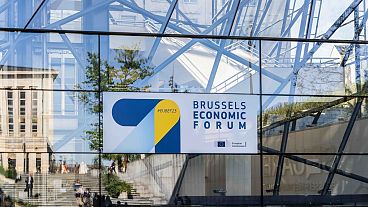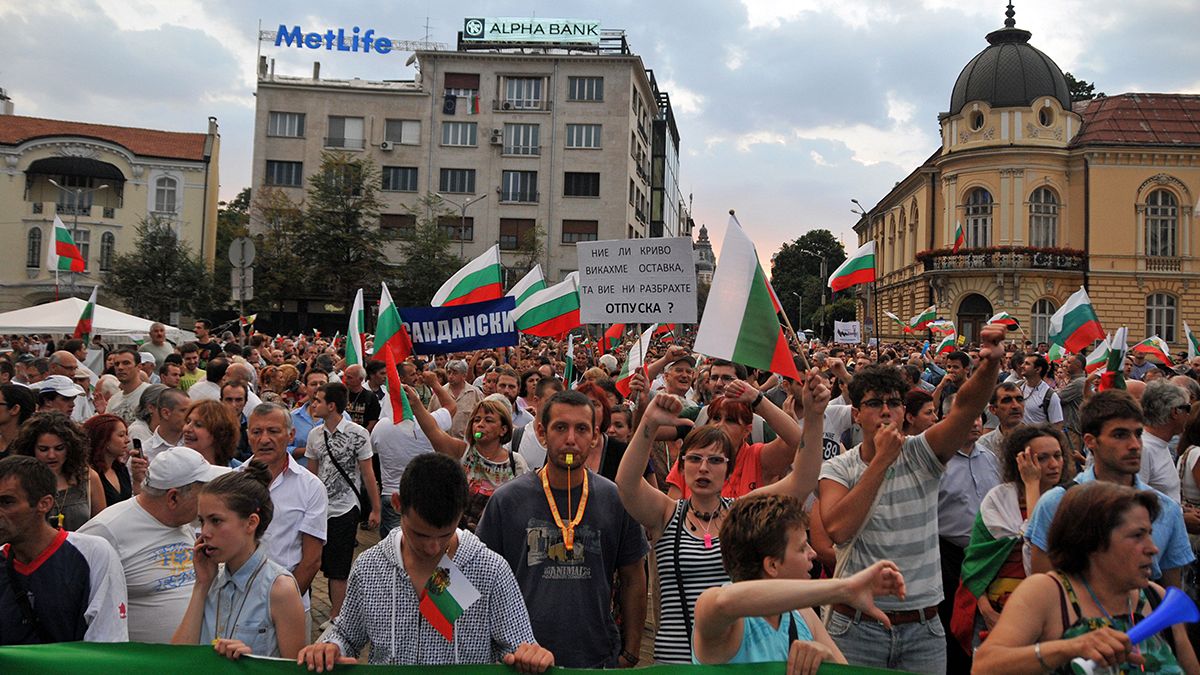Business executive Sasha Bezuhanova feels her life has come full circle.
More than two decades ago she took part in pro-democracy protests against Bulgaria’s crumbling communist regime. Now 50, she is back on the streets with thousands of others to protest against endemic corruption in the Balkan country and to demand the resignation of the new Socialist-led government.
Pointing to a tree in the heart of the government district where today’s protesters gather every evening, Bezuhanova said: “My husband and I stood by that tree in 1990 with our baby daughter to demand democracy and reforms. She is now 24 and studying at the London School of Economics but she is back here for the summer vacation and is protesting with us again. “We are here for the same reasons as in 1990 but hopefully with a bit more wisdom.”
Bulgaria, a Black Sea nation of 7.3 million sandwiched between Greece and Romania, has been transformed in the past 23 years from a financially bankrupt one-party state into an open, stable market economy anchored in the European Union and NATO.
But six years after joining the EU, it remains the poorest and one of the most graft-prone countries in the 28-member club, with average monthly salaries stuck at around 400 euros. The protesters, mostly young, well-educated and well-travelled, are deeply disillusioned with a political class they view as inept, opaque, corrupt and incapable of satisfying their core demand to live in a “normal European country”.
A colourful succession of prime ministers, ranging from Bulgaria’s ex-king Simeon Saxe-Coburg – forced into exile in 1946 by the Moscow-backed communists – to his former bodyguard Boiko Borisov, has nudged reforms forward but failed to tame the criminal gangs that still control parts of the economy. “We are now putting at risk the European, democratic path of Bulgaria. People who care about the country must stand up and say enough is enough,” said Bezuhanova.
Bezuhanova, an elegant woman fluent in English, is a good advertisement for the new Bulgaria, having turned it into one of a handful of global hubs for U.S. information technology giant Hewlett-Packard, which employs 5,000 people in Sofia. Inspired by the protesters’ energy and resolve, she has now quit her senior Hewlett-Packard position in the global emerging markets division to launch an online forum MoveBG to generate ideas and propose policies on how to modernise Bulgaria.
The forum’s motto “Bulgaria can” is a deliberate echo of President Barack Obama’s election campaign slogan “Yes we can”.
Middle class revolution
Every evening now for seven weeks, the protesters march along Sofia’s ‘yellow brick road’ – named after the colour of its paving stones – past communist-era government buildings and Orthodox churches to the parliament.
Their route takes them past open-air bars and restaurants – teeming with customers on a sultry Balkan summer night – foreign-owned banks and boutique hotels – all monuments to a new, hedonistic, capitalist Bulgaria in which some have prospered but many struggle to make ends meet. Like anti-government rallies in neighbouring Turkey and elsewhere, the protesters communicate via social media and are leaderless.
Unlike Turkey, Bulgaria’s protests have been largely peaceful and police have not used teargas or water cannon. “We are apolitical, we carry no party banner,” said Nikolai Staykov, 40, who call himself a “digital urban guerrilla” running an “anti-government information service”.
Like many protesters, Staykov has a background in IT, a flourishing sector that now accounts for 10 percent of national output thanks to a skilled workforce, low wage costs and Bulgaria’s proximity to major European markets. “We want to live in a Bulgaria where rules and laws are respected, where corruption and crime are punished,” said Polina Yancheva, 27, of Startup, a non-governmental organisation that helps young Bulgarian entrepreneurs mainly in the IT sector. “Many of my colleagues who went to study or work abroad want to return to Bulgaria but they worry that the business climate here is still too difficult.”
The protesters pledge to continue their daily rallies until Prime Minister Plamen Oresharski’s two-party coalition resigns. They shrug off objections that elections now would probably lead to a new government made up of the same discredited parties.
“This is a middle class revolution. We are stronger because we pay taxes and we know what we want,” said composer Viktor Stoyanov, 35. Many protesters also fret about what they see as increasing Russian economic influence in Bulgaria, especially in the energy sector, and have welcomed expressions of EU moral support in their standoff with the Oresharski government. “There is a geopolitical game going on here. If the EU does not back us, they will effectively lose Bulgaria. Russian influence will grow even more,” said Stoyanov.
Bulgaria’s previous centre-right government fell in February after street protests against low living standards and high utility bills. But today’s protests are not about the economy.
According to Georgi Kadiev, a lawmaker from the ruling Socialist Party (BSP), heir to the communists who once made Bulgaria Moscow’s most loyal ally in the Soviet bloc, the protests are about morality.
A divided country
“My colleagues said ‘the protesters will grow tired, they will head off to the seaside’, but this is not happening. They are becoming more radicalised,” said Kadiev, who believes the government should promise early elections next year – allowing time for tempers to cool – in return for an end to the protests.
Kadiev is a rare dissenting voice in the BSP. But he is also alarmed by the return of phrases such as ‘red trash’, used by some protesters about the BSP, which recall the polarised 1990s when it was still unclear whether Bulgaria would join the Western camp or revert to authoritarian rule.
Political analysts also caution that the protesters, well-heeled and mainly Sofia-based, do not represent all Bulgarians. Opinion polls indicate a divided country. A survey by the Open Society Institute showed 44 percent of Bulgarians back the protests and 33 percent support the government. Worryingly, 72 percent felt the situation in the country was “unbearable”. Nor do all young professionals support the protests.
Nadia Hadjova, 41, a British- and U.S.-educated lawyer, said she joined the 1990 rallies because the choice then was between democracy and communism. She questioned why today’s protesters didn’t use the ballot box. In a country addicted to conspiracy theories, some say the protesters are being manipulated or even paid by Borisov’s opposition centre-right GERB party because it wants to return to power – a claim both GERB and the protesters deny.
”Our destiny”
Ironically, Prime Minister Oresharski – target of the protesters’ scorn – introduced flat rate income and business taxes welcomed by the well-to-do middle classes when he served as finance minister in a previous Socialist-led cabinet. Now Oresharski, 53, cuts a lonely figure, derided in local media as a puppet of factions in the BSP and its coalition partner, the Movement for Rights and Freedoms which represents Bulgaria’s ethnic Turkish minority.
Oresharski told Reuters in an interview he would not resign because this would harm economic stability, and he struck a philosophical note about the protests. “We Bulgarians often say we have achieved nothing but we all know this is untrue. We have achieved a lot in the past 20 years. Maybe this negative feeling comes from high expectations and the desire to advance faster than is possible,” he said.
The protesters and their critics do agree on one thing. With their weeks-long protests, Bulgarians have defied the old cliche – rooted in five centuries of Ottoman Turkish rule – that they are passive and fatalistic. “There is a vibe in these protests that is sincere and good for the country,” said lawyer Hadjova. For composer Stoyanov it is about taking responsibility. “We Bulgarians have always looked for saviours to come from outside and solve our problems. That has to stop, we have to sort ourselves out,” he said.
As the heat abates on parliament square and the blue contours of Mount Vitosha – the vast, 2,290-metre (7,513 foot) mountain that soars above Sofia – melt into the dusk, the cacophony of the protesters’ drums, whistles and chants fades. Incongruously, somebody starts to play “Onward Christian Soldiers” on a white grand piano that stands at the foot of the equestrian statue of the 19th Russian ‘Liberator Tsar” Alexander II, who drove out the Ottoman Turks in the 1870s.
The tsar and his horse are swathed in Bulgarian green red and white flags. “This is an awakening; we are taking responsibility for our destiny. We are coming together,” said Bezuhanova, who hints that she may set up a pro-reform political party in the future. “Whatever happens, Bulgaria will never be the same again.”
(Reuters)


